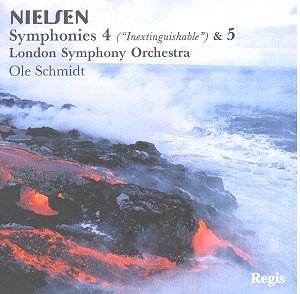Carl NIELSEN (1865-1931)
Symphony No. 4 Inextinguishable [34.02]
Symphony No. 5
[35.42]
 London SO/Ole Schmidt
London SO/Ole Schmidt
rec 1974, St Giles, London
 REGIS RRC 1036
[69.45]
REGIS RRC 1036
[69.45]
Around £6 from most retailers

Regis have done rather well at plundering (under licence, of course) various
catalogues. I hope that they will continue.
At one time if you wanted to read about Nielsen you had Grove (at that stage
Grove 5) and a slightly expanded pamphlet on the six symphonies from the
BBC by Robert Simpson. As for recordings, in the early 1970s you had to rely
on RCA, Turnabout and Decca Eclipse and names such as Carl Garaguly, Erik
Tuxen and Launy Grøndahl and 'closer to home' André Previn
and Ormandy (both RCA). The highest jinks of all were from Bernstein whose
CBS 3-6 are still worth getting if you see them. There was no single
conductor-single orchestra cycle. Then onto the scene sprang Unicorn's LPs
(KPM7001-3) of all six symphonies hotly pursued by the Danish RSO conducted
by Herbert Blomstedt (who returned to the symphonies for Decca in the 1990s
with the San Francisco SO) in all six symphonies interspersed with many of
the small orchestral works and all three concertos.
Here at Regis's bargain price two of the strongest of the symphonies are
resurrected from their 1970s slumber. This is not the first time they have
been on CD (Unicorn-Kanchana UKCD 2000-2002) but it is the first time at
bargain price.
Schmidt and the LSO give full rein to the throaty ramping and shuddering
gear changes of No. 4. Listen to the irrepressible howl of the horns at 0.17
in the final of the four movements. This music has less to do with tragedy
than with the expression of the grinding plate tectonics of nature's irresistible
life force. The woodwind are played with the necessary coarseness giving
that icy-salty savour so essential to the enlivening pulse of Nielsen's music.
The percussion have been rendered with more bass impact in other recordings
but the famous duel still registers with visceral charge. As a work the Fifth
is humanity to the Fourth's nature. It is given a wonderful outing by Schmidt.
My how well he terraces the dynamic variations and echoing terrain in the
first movement! In the radiant adagio the horns toll in unfeigned
glory and the cursing of the side drum raps out its disruptive and aleatoric
way.
Regis are to be congratulated on a thoughtfully chosen revival from which
they have freshened the sound from the original and later issues. Any chance
that they can license the remaining tapes?
Rob Barnett


